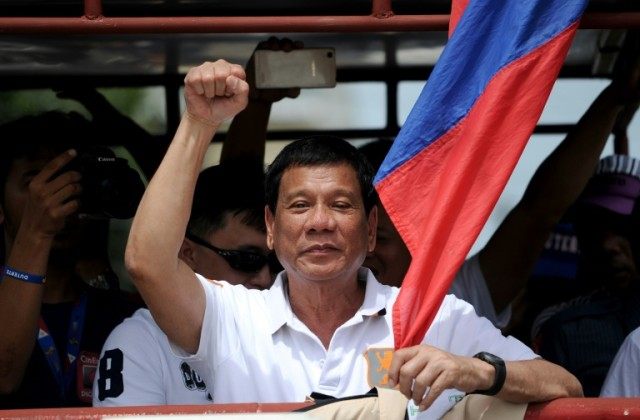The Philippines has a new president: an aggressively anti-crime mayor who has vowed to jet-ski to the disputed territories of the South China Sea and personally plant a Filipino flag. China’s state media have reacted to Rodrigo Duterte’s election with an invite to “win-win cooperation” – coupled with a threat that it will respond in kind to any “blackmail” regarding its colonization of Philippine territory.
China’s major state-run news outlets – Xinhua, the People’s Daily, and the Global Times – have all published columns encouraging the new president of the Philippines to drop actions against China’s “reclamation” of the Spratly and Paracel Islands, among other territories in the region. China’s claims overlap with the sovereign territory of the Philippines, Vietnam, Brunei, Taiwan, and Malaysia. The Philippines has been especially aggressive protecting their territory however, as they have filed a case with the Permanent Court of Arbitration at The Hague, asking for an official decision on where China’s maritime borders end. China has vowed to ignore the decision regardless of whether it benefits Beijing.
Before Philippine officials confirmed that Duterte had obtained an unsurpassable number of votes in Monday’s election, Xinhua warned whoever the winner of the election ended up being to undo the work of outgoing President Benigno Aquino in strengthening the defense of the nation through cooperation deals with the United States.
“Unfortunately, over the past six years, under President Benigno Aquino’s rule, the Southeast Asian country has increasingly fallen under the influence of warmongers in Washington and Tokyo, while achieving little in real benefits and progress for its people,” one column reads, encouraging the Philippines to assert its claims through a “strong and independent [Association of South East Asian Nations],” instead of international courts. “Being a puppet of Uncle Sam and trying to manipulate the bloc will definitely be unhelpful,” the column continues.
Another article in the People’s Daily accuses Aquino of making “nationalism … a part of the psyche of many have-nots,” forcing candidates to succeed him to make stern statements against Chinese incursions into Philippine territory. By the time Duterte was confirmed the winner of the election, Xinhua claimed in a new article that he was the only candidate to make pro-China statements. “During his election campaigns, Duterte has clearly noted that he has a similar position with China and that he does not believe that the South China Sea issue could be solved through a verdict by the arbitration court,” Xinhua claims, quoting him as opposing the use of an international tribunal.
A news report in the Global Times also seems to present Duterte as the best option for China to land in Manila. The story cites a “columnist and analyst in political science” describing Duterte as “a strong-willed leader with outstanding track record as moyor of Davao city” who personally “excites me.” The story does not mention any criticism of Duterte’s crass style and threats to preside over a “bloody” presidency.
Xinhua is correct that Duterte has opposed unilateral military action to keep China out of the Spratly Islands, calling the inevitable result of such a move against a global power like China a “massacre.” It leaves out his alternative plan: “I’ll go down, riding a jet-ski, carrying a Filipino flag … and then I would say, ‘This is ours, and do what you want with me.’” Duterte stated in a debate he is open to dying during this operation. “I have the ambition of being the hero, too,” he added.
The Chinese government does appear to have some reservations about trusting Duterte to allow its colonization of the South China Sea to continue unchallenged. Foreign Ministry Spokesman Lu Kang warned the new Philippine administration that Manila “pretends to be a victim,” something China will no longer tolerate. Lu also warned against “blackmail on the South China Sea issue” and asked Manila to ignore “wantonly manipulated international law,” specifically referring to the United States.
China begun new military exercises in the South China Sea Tuesday, a sign that their hopes for a pacifist president in Duterte will not stall their militarization of the region. China claims these exercises are regular annual war drills to protect Chinese territory, defined as including the Spratly and Paracel Islands.

COMMENTS
Please let us know if you're having issues with commenting.